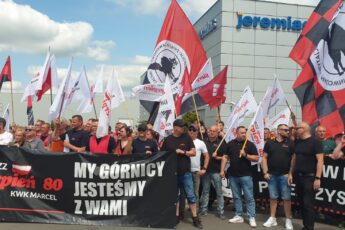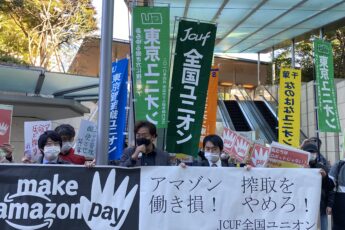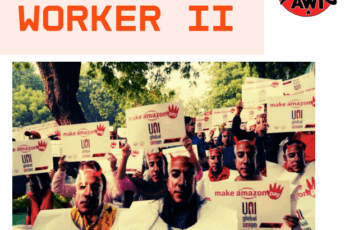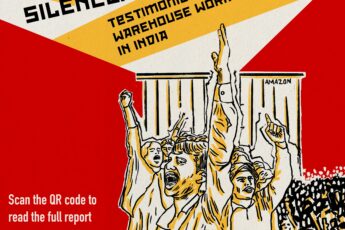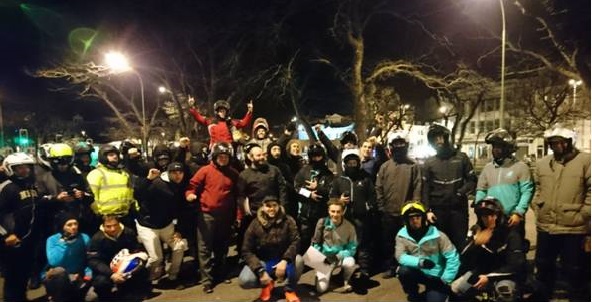
by CALLUM CANT (Plan C and Class Inquiry Group, London)
The transnational wave of strikes that is shaking the delivery platforms continues: here we publish a contribution by Callum Cant of Plan C on the recent wildcat strike against Deliveroo in Brighton. This strike links with the Black Friday week of actions, strikes and demonstrations in the logistic sector across Europe. Together with the Amazon workers on strike in Italy, Germany and Poland, food delivery workers have disrupted business as usual in many cities, such as Brussels, Amsterdam, Berlin, Bologna, Turin and Milan. In Brighton Deliveroo workers protested for stable and decent wages. The flying pickets affected also the newly opened Deliveroo kitchen, extending the protest beyond the circle of the delivery workers and showing a strong capacity of organizing even without a formal structure. In fact, the riders, the majority of which are migrants, went on strike without a trade union’s support. Experiments of strike against the logistics of exploitation are spreading around: the attempt should be to connect and potentiate them on a transnational scale, and foster the process of strike as a tool of political communication, a field of organisation, a chance of mass insubordination. To make possible the unexpected.
On Saturday night, over fifty Deliveroo workers in Brighton stopped work. The wildcat strike was organised through rank and file networks and led by migrant workers. They are demanding stable, decent wages – and using new tactics to increase their leverage. ‘We have to fight or else they f** us’, one striking rider said. ‘There is no other option’.
The strike follows a consistent reduction in wages for workers in the city over the last month, caused by Deliveroo’s refusal to guarantee a minimum hourly wage. In Brighton pay is a £4 a drop only – so pay can fall to £0 an hour if there are too few orders and too many riders. It is also the first mobilisation since a court denied Deliveroo workers the legal rights of the ‘worker’ category and continued to define them as ‘independent contractors’. Workers have now responded, and proved that if judges deny them rights, they will take them through their own organisation and action.
After a rally in the city centre, workers set off on a flying picket in a large moped convoy, followed by a quick-response police van. The pickets were able to persuade large numbers of other Deliveroo workers to cancel their orders and join the strike. Within half an hour, the Deliveroo customer app was showing a warning: ‘Not seeing your favourite? We’re very busy in your area right now’. Even in the conditions of platform capitalism, strikes have the power to stop capital accumulation in its tracks.
There was a new element to this Saturday’s action. Unlike the earlier strikes, there was a picket line at the new Hove ‘editions’ kitchen, owned by Deliveroo. These kitchens are hired out to popular restaurants and used specifically for delivery purposes, allowing restaurants to expand their production capacity at a relatively low cost. For the duration of the strike, workers shut the site down. As the composition of capital changes at Deliveroo, so does the form of the struggle. Workers are developing methods to intervene in the labour process and stop it dead. Wherever Deliveroo has invested in constant capital, the workers will use that chokepoint to exert leverage.
Labour unrest first broke out in Brighton earlier this year, with a large strike and a series of demonstrations taking place between February and May. The initial struggle was organised through the small union the Independent Workers of Great Britain, and made three demands; 1. A pay rise of £1 to £5 a drop, 2. A hiring freeze, 3. No victimisation of striking workers.
The demands of the old struggle still apply, but they are less prominent than before. Since the last strikes, the pressure of low wages and rapid turnover mostly got rid of the unionised core of cyclists, meaning that the union has been less central than previously. This time, the strike was led by non-unionised migrant moped riders, who communicated via WhatsApp groups to organise the action. The fall in wages has hit them particularly hard, as they are more likely to work full-time. Their initiative is now the determining factor in the political composition of the struggle.
During the strike, workers didn’t put much effort into communicating formally with management. Instead, they created chaos and waited for Deliveroo to respond. The lack of street-level management, whose role has been automated by the app, means that the relationship between workers and bosses tends to be antagonistic and uncommunicative. There is nobody to make demands to in the workplace, and no route to take towards collective bargaining.
Given that Deliveroo externalise the cost of bikes and equipment onto riders and don’t pay a minimum hourly wage, they have no incentive to prevent labour oversupply. If workers are sat on the street earning £0 an hour, it costs them £0 per hour. This constant over-supply guarantees there is always a pool of available labour to deal with variation in demand. For workers, however, labour oversupply is disastrous. On a total piece rate system, there is nothing to prevent wages hitting zero. They have to either win a guaranteed hourly wage or enforce limits on hiring in order to control wages. So far, they have chosen the latter option.
The political dimension of the struggle is, at the moment, evident but underdeveloped.
Like in the French Deliveroo workers’ slogan ‘La rue est notre usine’ – the street is our factory. These conditions mean that strikes tend to take on a general political resonance about the conditions of exploitation. However, the analysis of precarity and the cross-border scale of the struggle which was evident earlier this year are not so prominent now. It will take further developments in this direction before workers start demanding guaranteed hourly wages for all or making connections to the transnational movement.
If they eventually chose to do so, however, they will find allies across Europe. In November alone there have been office occupations, demonstrations and strikes by food delivery platform workers in Brussels, Amsterdam, Berlin, Bologna, Turin and Milan. This sector-wide hot autumn shows that the transnational strike wave in food delivery platforms is far from over.


